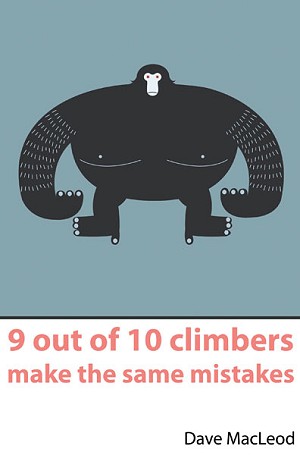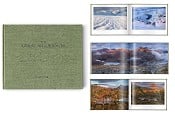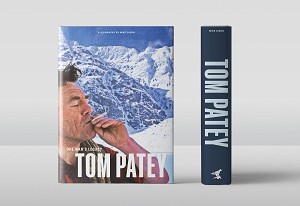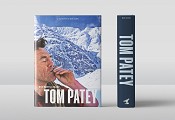
Now a new entrant to this crowded field has appeared, an unlikely-appearing contender for the best in its field. It is slim, has no color illustrations or accompanying DVD, in fact no illustrations at all save an unhappy over-muscled gorilla on the front cover. It contains no chart-laden prescriptions for training cycles, hangboard workouts, or other programs. Furthermore, it assumes that the reader, like the gorilla on the cover, has got issues. In other words it is not a relentlessly positive upbeat kind of book, such as most American productions tend to be.
Yet as I say, this may be the best training book out there for a certain kind of climber, the climber for whom the positive attitude and encouraging words of the other books are no longer working. They have done the training programs, followed the routines, visualized the heck out the routes and are still stuck in the rut. MacLeod's book is a healthy reminder how hard climbing can be and how it is to work out of a plateau. The book comes with a kind of warning at the very beginning: “This book is for anyone ready to challenge and change their climbing habits.” This book is not for the beginner. Indeed a beginner will not understand the world it describes, a world of struggling with frustration on routes or problems that should present no difficulty thanks to years of experience and training. The climber who needs this book is the one who gets aggravated because “5.12 should be easy by now” or “Anyone can climb 5.13 these days, why can't I?”
For me, who has lived in this world on and off for years, owing to life changes, injury, etc, MacLeod's book is a refreshing back-to-basics approach that emphasizes reality over wishful thinking. He reminds the reader that the natural tendency for climbers is to seek a comfort zone and call that success. However comfort turns into a trap owing to the simple reality that climbing is hard and hard climbing is really hard. MacLeod seeks to remind the climber about how many subtle or underrated factors can direct climbers away from the path of actual improvement and toward stagnation and frustration.
So what are the concrete ideas or practices that MacLeod proposes? Early on he offers the thought that climbers are afraid of change more than anything else since change implies a risk of failure. Failure for many climbers is both personal and public, at least in their minds, and the sense of self-worth that climbing gives has an ugly side when climbing fails to deliver it. As MacLeod rightly points out, they will compensate by working on what they know they will succeed at, which is typically strength training or a single type of climbing or even hold. For example, I know that I prefer climbing on small crimps in a quiet, relatively cool place. But, sometimes, I know I have to climb at the Spot on slippery blobby pinches in the heat and fail on 4 spots in front of a crowd. It's frustrating but there it is. MacLeod himself recommends the same thing as it keeps him honest about how he's doing. He sums it up by adding, “Sticking with what's comfortable isn't a slow steady way to improve. It's a slippery slope that starts off too shallow to notice but steepens alarmingly down the line.”
Macleod argues that technique is at the heart of climbing well which of course everyone claims to know already. But do they really? MacLeod's analytical approach turns the screws a little tighter. Ask yourself, he says, how much time you actually climb in a given training session. Maybe 30 minutes out of two or three hours? What are you doing in the meantime? If you aren't focusing on remembering what worked, what didn't, and thinking about why, you have cut the time value of the session by half or more by not learning from it when the experience is freshest. The same theme is encountered in his discussion of doing climbing drills. If you are not consciously developing skills by lower intensity climbing movements done really well, you are missing a great opportunity to focus on improvement instead of staving off failure. Throughout the book this theme of extracting value and efficiency provides a foundation for clarity on thinking about how to improve.
And really the rest of the book goes on in this vein. It is so concise, so direct, and so rich in terms of advice that this review could go on for pages, picking only highlights. If there is a quibble I have it might be the lack of illustrations which in a few instances could clarify points the author is making. However since this is aimed at the experienced climber, most of us can visualize what he is getting at pretty easily. Part 3, about falling, I am somewhat ambivalent about. I agree that removing the fear of falling is a vitally needed skill. However I am not sure whether the analogy of climbing being safer than driving is quite accurate. In other words, even in really safe settings, a mismanaged fall, whether bouldering or sport climbing, can have quite bad consequences, even when the situation was thought to be under control. I can't count the number of friends who have badly injured themselves like this. It takes a long time to get back the confidence lost after an injurious fall. Curiously, the idea of wearing a helmet is not mentioned, even for trad falls. So tread warily but confidently out there unless you know for sure what you're about.
Overall, I would unhesitatingly recommend this book. The insight the author gives into the world of high-end climbing is invaluable and his candid, thoughtful, and clear prose conveys advice in a way that is likely to be heeded. If you have been there, frustrated and at a plateau and haven't really thought out why, buying this book would be a good first step towards getting out of the rut. 9 out of 10? More like 10 out of 10.
I should add that Dave's Online Climbing Coach blog is invaluable as a resource for more information and ideas.
- You can buy the book direct from Dave MacLeod: Dave MacLeod's Web Shop
Price: £15
- You can read more info from Dave on this UKC Premier Post
- You can read more reviews and thoughts from Peter Beal on his excellent blog: Mountains and Water









Comments